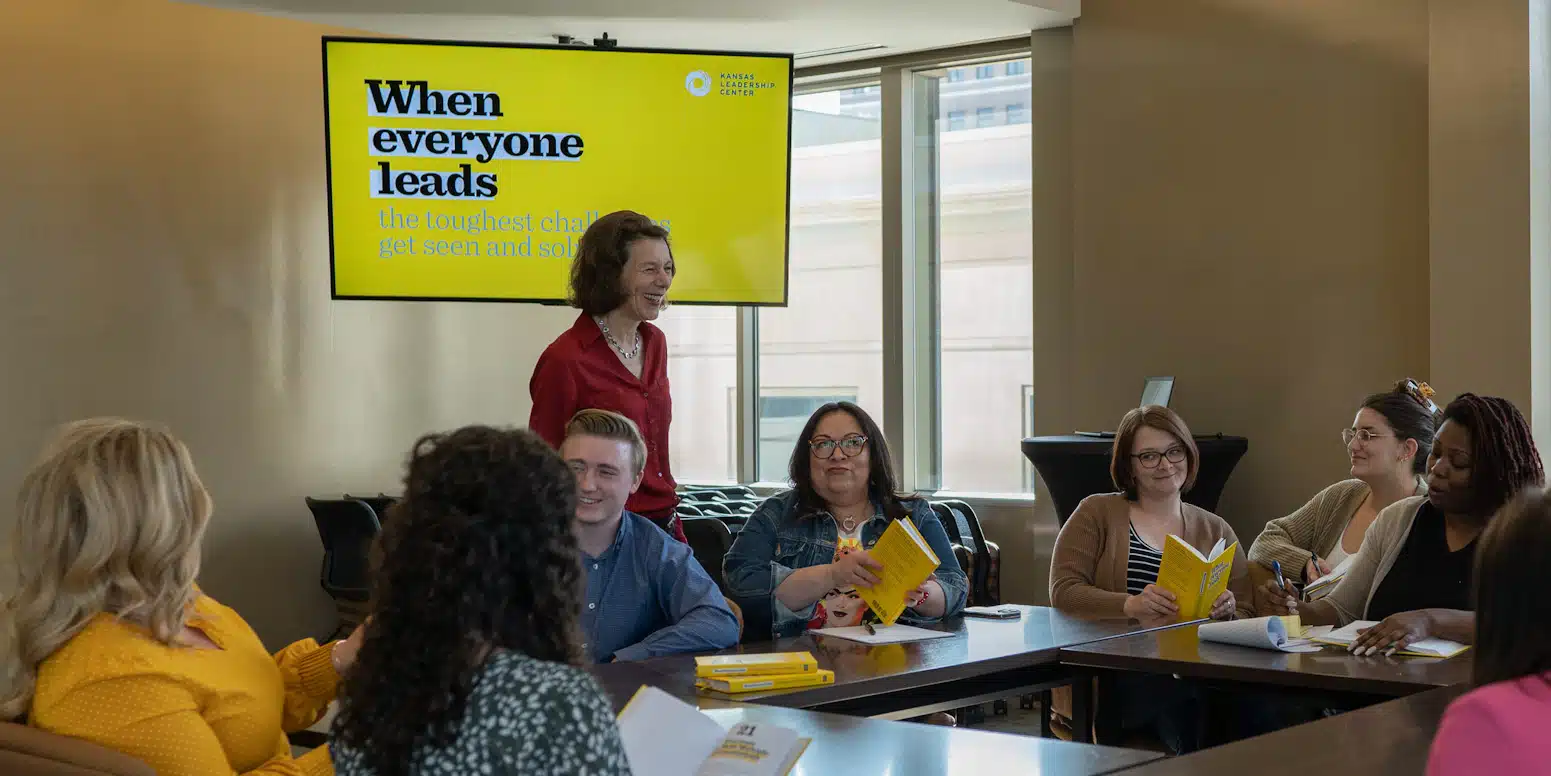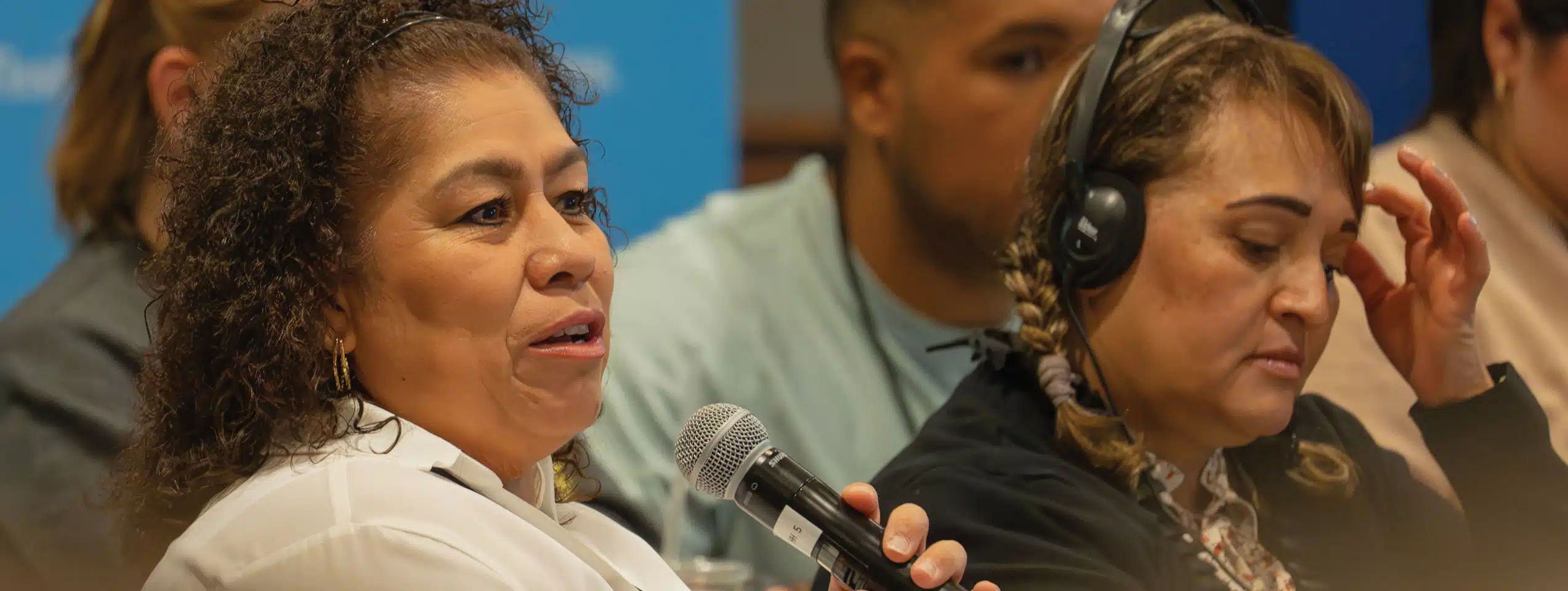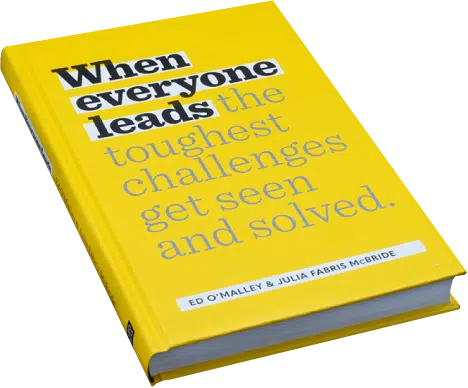As the cold descends upon Kansas, and as COVID-19 keeps its icy grip on the nation, leaders around the state are finding ways to offer respite from the winter doldrums by creating outdoor spaces to safely study, socialize and replenish the souls of those aching for camaraderie.
Kansans don’t exactly flock outdoors as the temperature drops and the days grow darker. But why not? Minnesotans transform snow covered golf courses into cross-country ski destinations, and outdoor cafes are buzzing all year long in Denmark, said Andy Fry, a Topeka man who rallied his College Hill neighborhood to set up an outdoor space for students.
“It’s not that our bodies aren’t capable of it, but maybe we’re not accustomed to it in our culture,” Fry said. “It’s not to say that we couldn’t do it or we couldn’t adapt as a culture.”
Fry’s group is one of several around the state using Kansas Beats the Virus grants to make the outdoors a palatable, safe alternative to holing up inside. Kansas Beats the Virus is a campaign organized by the Kansas Leadership Center and the state of Kansas to spur creative, grassroots solutions to stopping the spread of COVID.
The campaign organized more than 850 meetings around the state last month, and has awarded nearly $800,000 in grants to help implement the ideas.
As in Topeka, many of these outdoor efforts aim to facilitate schoolwork and socializing among students (including one in an innovative, nonprofit café). And if there is one overriding lesson it is: If at first you don’t succeed, try, try again.
Internet in the park
In Topeka, Boswell Square Park is ground zero for Fry’s hope for cold-weather adaptability.
The neighborhood is using its grant money to purchase equipment to provide wireless internet in Boswell Square Park. Users will likely need to be outside, of course, but neighborhood residents had already seen students huddled on neighbors’ porches, borrowing internet signals because they had none or had unreliable service at home. A recent connectivity survey by the school district found that their neighborhood wasn’t as connected as others.
There is a sense of urgency, since safety guidelines in place in Topeka schools make it likely students will be learning remotely for the foreseeable future. The signal is strictly to enable learning, so streaming movies is off-limits, Fry says.
The project has hardly been simple, Fry said.
His advice? Be patient. Bringing the idea to fruition didn’t happen overnight and there were hiccups along the way. Remember everyone is volunteering their time and they likely have jobs and families to attend to as well.
Fry also urges Kansans to be flexible. Not every plan will work.
Initially Fry was convinced that his group could provide outdoor heaters to local coffee shops and cafes in order to spur economic activity throughout winter. No one wants to meet for a hot meal in freezing weather. But he envisioned family or friends agreeing that they could meet up outdoors for a quick cup of coffee or a beer after work at a local brewery. The heaters would help make it comfortable.
The idea was perfect, he thought. But businesses weren’t interested. Customers aren’t used to going outside in the winter, they said.
“They’re not used to this?” he said pointing out the folly in that thinking. “They play in the snow. They do stuff all year long. Just because it’s not a socialized behavior doesn’t mean they can’t do it.”
His group moved on, and he encourages Kansans to experiment. “Because if you didn’t try something different, we wouldn’t make any progress or we wouldn’t make any change.”
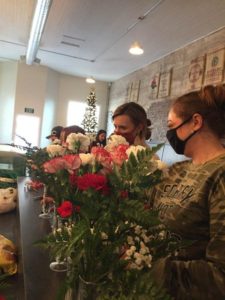
The 4:10 Irish Den in Chapman hosted a party to make flower arrangements for the local nursing home around the holidays. (Submitted)
In Chapman, the school district covers about 50 square miles. Many children are bused home after school and can’t easily pick up and return for a football game or other school event. Walking around town or hanging out with friends in town was pretty much the only alternative until Traci Lewis moved to town with her three kids and husband, who had taken a teaching job at the middle school.
Her solution? Starting a nonprofit youth coffee shop. It’s called 4:10 Irish Den. It is named for the school mascot, the Fighting Irish and the fourth chapter of First Peter in the Bible, which is about working together.
The shop has taken years but was to be ready last fall for when students returned to school after summer break. The pandemic wiped out planned fundraising events, but the space had been gutted, painted and finished, so Lucas decided to open early without the coffee equipment. Remote learning made the space more essential than ever.
Lucas loved the idea of coming up with a homegrown solution to battling the virus. And grant money through the Kansas Beats the Virus campaign is helping with immediate needs presented by COVID and will serve the shop’s clientele for years to come.
The grant will help fund an outdoor space complete with heaters and a pergola where kids can safely gather during the pandemic. Volunteers will provide free labor to build the structure and prepare it. The space is protected on three sides by buildings, so it will be usable all but the coldest days.
The added space will be a big help. The Chapman youth center was already overflowing with students who needed access to reliable internet for remote schoolwork. The school provides hotspots that have helped somewhat, Lucas said, but that still means students will be isolated at home.
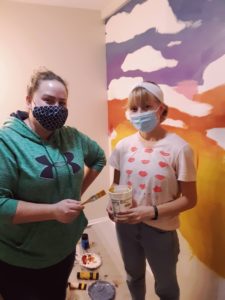
Kayla Kinser, left, and Della Hettenbach painted a mural on a wall at 4:10 Irish Den. Kinser is the art teacher at the high school, and Hettenbach is a student. (Submitted)
When they first applied for the grant, Lucas said they didn’t have every detail defined. But working quickly is part of operating in a pandemic. “We’re building the plane as we’re flying it,” she said. “Everyone is trying to do the best they can.”
Lucas knows there are some who don’t agree with a gathering of any kind. She respects their views and invites understanding.
When local schools went hybrid, not everyone had internet, even with the hotspots, and they couldn’t keep pace with the schoolwork. That was simply unacceptable. Beyond that, teens are going to gather, she said. Pretending it doesn’t happen is irresponsible too.
“The kids are going to be getting together whether we organize or they organize. We can make sure masks are worn,” she said. “If we don’t create events, the kids are still going to get together.”
Inside the coffee shop, masks are required and social distancing is enforced when kids are eating and drinking.
Safety is a top priority for Lucas. As the pandemic has worn on, she has a deep concern about the mental health of the area’s youth. Quite a few kids, she said, just need a place that is calm, peaceful and safe.
“Mental health is just as important as physical health,” she said. “What good is it to keep the kids from contracting the virus if they’re just committing suicide? I’m just stating my heart.”
Since the building opened it’s been a safe spot for end-of-the year athletic parties, Bible studies and much more. It’s proved to Lucas that life in the pandemic doesn’t have to abruptly stop altogether.
“We still need to get together and have some fun and joy,” she said.
Dawn Novascone is a Lenexa-based freelance writer.
